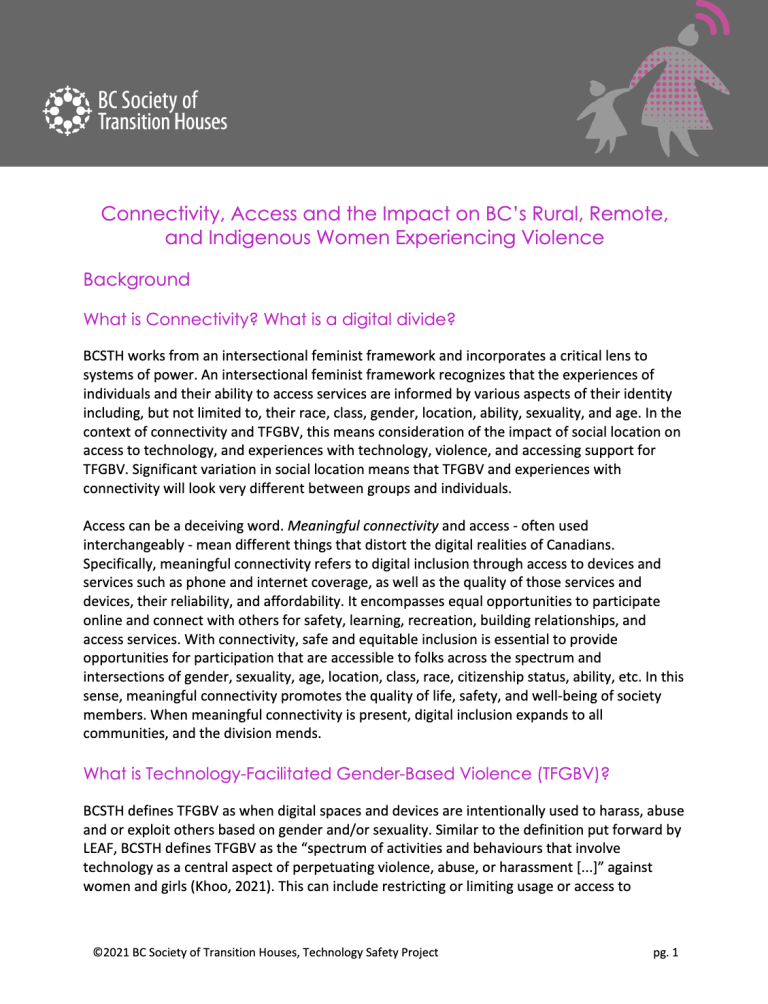12 search results
for
Non-profits and community organizations
For government, RRI communities, private sector, phone and internet providers
Women and Girls in Rural, Remote, and Indigenous (RRI) communities face added barriers to meaningful connectivity due to their rurality.
Recommendation 4: ISPs could consider partnering with RRIs communities to develop alternatives so that communities have increased choices. This could work in conjunction with increased affordable internet and phone plans, as well as related equity and accessibility reviews (Organizations such as Pathways to Technology and The First Nations Technology Council are working in this field).-
Category and theme:
Audience:
For NGOs, BCSTH, government, private sector, phone and internet providers
Women and Girls in Rural, Remote, and Indigenous (RRI) communities face added barriers to meaningful connectivity due to their rurality.
Recommendation 5: Research whether additional “light” or “lightweight” versions of websites can be developed in order to decrease demand on the internet for individuals trying to access these sites ( CBC news recently launched “CBC Lite” to make news more accessible to rural and remote Canadians. https://www.cbc.ca/news/canada/montreal/introducingcbc-lite-1.5943819)-
Category and theme:
For BCSTH, government, advocacy organizations and NGOs
Lack of meaningful connectivity negatively impacts both service providers and service users.
Recommendation 7: Support meaningful connectivity for anti-violence workers of all abilities and make online training more accessible by providing closed captions on online webinars.-
Category and theme:
Audience:
For BCSTH, government, advocacy organizations and NGOs
Lack of meaningful connectivity negatively impacts both service providers and service users.
Recommendation 8: For online training or webinars, accommodate varying levels of connectivity by providing text copies of slides (in the description, caption, etc.) in case audio cuts out for anti-violence workers tuning in from RRI communities. Provide copies of slides before the training session so that participants can attend in listen only mode.-
Category and theme:
Audience:
For BCSTH, antiviolence organizations/member programs
Lack of meaningful connectivity negatively impacts both service providers and service users.
Recommendation 9: Develop and provide more comprehensive digital literacy training for RRI anti-violence workers.-
Category and theme:
Audience:
For BCSTH, antiviolence organizations/member programs
Lack of meaningful connectivity negatively impacts both service providers and service users.
Recommendation 10: Provide spaces for anti-violence workers and organizations in RRI communities to collaborate, interact, and share their experiences in the spirit of mutual support and solidarity; support the implementation of communities of practice for rural membership such as the Safehomes Community of Practice for rural members that BCSTH is organizing. One anti-violence worker voiced that the development of this kind of interaction would be helpful to countering at times urban centric policies and systems.-
Category and theme:
Audience:
For BCSTH, NGOs, anti-violence organizations, member programs
Lack of meaningful connectivity negatively impacts both service providers and service users.
Recommendation 11: Organizations can promote anti-violence worker’s wellbeing and prevent burnout (which could impact service delivery) by developing occupational health and wellbeing policies that reflect new delivery methods and contexts such as those that utilize more technology, including remote service delivery or work from home situations.-
Category and theme:
Audience:
For BCSTH, NGOs, anti-violence organizations, member programs
Lack of meaningful connectivity negatively impacts both service providers and service users.
Recommendation 12: Agencies can advocate for funders to pay for internet for anti-violence workers.-
Category and theme:
Audience:
For BCSTH, governments, schools, NGOs, anti-violence organizations
Unique contexts specific to RRI communities result in a different significance of meaningful connectivity, as well as distinct challenges, for women in these communities.
Recommendation 13: Incorporate information about online misogyny into technology literacy resources for youth to account for unsafe online spaces and support them in safely navigating the internet.-
Category and theme:
Audience:
For BCSTH, antiviolence organizations, NGOs
Unique contexts specific to RRI communities result in a different significance of meaningful connectivity, as well as distinct challenges, for women in these communities.
Recommendation 14: Develop online dating safety resources for RRI women as components of tech literacy for both service users and providers, in ways easily accessible to tech literacy “beginners” and adult women.-
Category and theme:
Audience:
